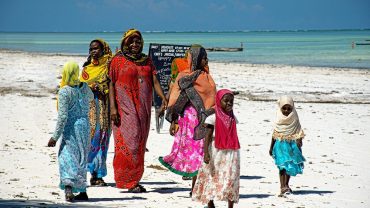Coronavirus Covid-19 (2019-nCoV) has now spread to many countries across the world since February, with suspected cases being reported currently in more countries. The total number of suspected cases reported from various countries, where no case is confirmed, is on the rise, while many other countries have confirmed cases of sick people.

Coronavirus or Covid-19 (2019-nCoV) originating in Wuhan, China, have has now passed the 104.000 cases spreaded in many countries across the world. Various screening and preventive measures are daily implemented by countries with coronavirus to control the spread of the virus.
WHO, World Health Organisation has identified 13 countries in Africa as being at risk of the coronavirus infection. These countries include Algeria, Angola, Cote d’Ivoire, the Democratic Republic of the Congo, Ethiopia, Ghana, Kenya, Mauritius, Nigeria, South Africa, Tanzania, Uganda, and Zambia. They have had direct links with China or being involved in a large volume of travel from/to China. Effective screening mechanisms have been introduced at all major airports of these countries.
Here an update country by country
Equatorial Guinea
Coronavirus suspects in Africa are on the rise, with the virus now suspected to have reached Equatorial Guinea through travellers from China. A total of 26 passengers that arrived to the country from China have been quarantined. Six of the quarantined were discharged on 12 February.
Equatorial Guinea announced its plans to donate $2m to China on 07 February to support its fight against the virus, reported the BBC.
Sudan
Sudan registered two suspected cases of coronavirus infection on 29 January, becoming the second country to report coronavirus in Africa. The two patients, a man and a woman, had recently visited Wuhan, the epicentre of the coronavirus outbreak. They arrived in the country through Ethiopian Airlines and Egypt Air from China.
The suspected cases were identified through precautionary and monitoring measures implemented at the Khartoum Airport, Radio Dabanga reported. The two cases have been reported to be negative. A total of 266 passengers arriving from China were screened and examined in the states of Khartoum and El Gezira. Further, 200 students from Wuhan are set to arrive in the country from various parts of China.
Checkpoints have been placed at various airports and ports including the Khartoum Airport, Port Sudan Airport, and Port Sudan Port. Two isolation centres have been prepared at the Khartoum Hospital and the Khartoum airport.
Here’s the countries that had suspected cases but with negative test esit.
Botswana (30 January)
Namibia (01 February)
Angola (29 January)
Ivory Coast (Côte d’Ivoire) (26 January)
Ethiopia
Kenya (28 January)

There are some countries where Italians cannot travel to. Or where it is not convenient to go in the short term. The situation is monitored by the Farnesina through the viaggiaresicuri.it portal. In addition to the municipalities in the red zone in Lombardy and Veneto, “sealed” by decree, here are the other destinations where there are critical or prohibited areas and which, however, have restrictions.
In Tunisia, it is also possible for asymptomatic cases of fiduciary home stay with active surveillance for 14 days. For suspicious cases, medical isolation and transfer to dedicated hospital facilities is foreseen.
In Cape Verde, direct charter flights to Italy are suspended.
In Mauritania, Eritrea, Congo, Mozambique, Zambia and Chad, compulsory 14-day quarantine for those coming from Italy.
In Benin, mandatory quarantine.
In Nigeria, those arriving with suspicious symptoms must be tested for coronavirus and, if positive, can be quarantined.
In Djibouti, foreign nationals with suspected contagion can be quarantined.
In Gabon, possible restrictive measures (from compulsory quarantine in local health facilities to rejection at the border) against Italians.
In Malawi, protective health measures including 14-day quarantine against travellers arriving from countries at risk.
In Kenya, travellers coming from Italy, in case of detection of compatible symptoms, may undergo health checks and quarantine measures or be immediately repatriated to Italy, with the possibility of an extension of these measures also to those who have travelled by the same means. The local authorities recommend that a medical certificate, translated into English, certifying the absence of coronavirus infection be provided.
In Tanzania, anyone showing suspicious symptoms is tested for coronavirus and, if positive, can be placed in quarantine.
In Uganda, passengers, in the absence of symptoms, will be subject to compulsory self-isolation for 14 days, with daily monitoring by local health authorities. In the presence of symptoms compatible with coronavirus, compulsory hospitalization for up to 14 days at the identified isolation centres.
In Angola, entry forbidden for those coming from Italy.
In Botswana, suspected cases are placed in isolation in a clinic and subjected to further testing. These tests are sent to South Africa and the patient remains in isolation until the report arrives (about 3-4 days).
In South Africa, in case of flu symptoms, travellers could be subjected to a fourteen-day quarantine.
In Mauritius, no access for travellers from Lombardy, Veneto and Emilia Romagna. The ban may also be extended to other categories of passengers, including Italian citizens from other regions in addition to those already mentioned.
In the Seychelles, it is forbidden for all airlines to board passengers who have been in Italy, China, South Korea and Iran in the last 14 days.
In Madagascar, travellers from Italy are advised to cancel or postpone their trip. All airlines are prohibited from boarding passengers or crews coming from or having stayed in Italy.
To remain constantly updated:
https://www.worldometers.info/coronavirus/




Comment (0)